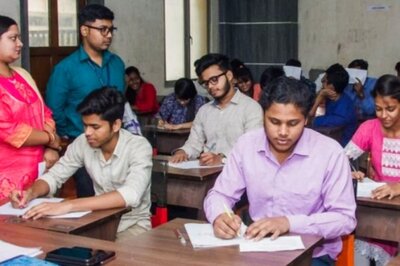
views
Necessity, they say, is the mother of invention. A time worn cliche all right. But it is true, has been so since time immemorial. The early man discovered fire to cook animal meat. He used animal skin to cover himself and found caves for shelter to keep himself safe from wild beasts and the hostilities of weather. A classic example of this can be seen – though in modern times -- in the Tom Hanks starrer, Cast Away, which in 2000 told us the story of a FedEx employee finding himself stranded on an uninhabited island after his cargo plane crashes during a severe storm. Cast away for four years, he – called Chuck in the movie – learns the hard way to adapt through a mindboggling variety of ways that include catching fish with a crudely made arrow and storing water to drink in empty coconut shells.
In an important way, the current Coronavirus pandemic that has locked down the world (at least most parts), has not spared the cinema industry – where social distancing can be virtually impossible. And film shoots have been stopped for weeks on end. Or, is that so?
A recent article in The Hollywood Reporter says how cinema producers have found novel ways to keep their industry going. Resourceful and remarkable they are. “The streets outside MMC Studios in Cologne, Germany, are empty. But inside, it is business as usual — almost — for, the crew of Unter Uns, a hit German teen soap, which has continued to shoot even as the rest of the country, and most of the world, have gone into lockdown due to the coronavirus pandemic”.
"When the German Government introduced stay-at-home measures [on March 22], we paused production for a week," says the show's producer, Guido Reinhardt. "We had to figure out how we could comply with the new quarantine regulations and still keep working."
Reinhardt's team thought of an 80-point plan with typical German precision that included temperature checks, hand washing, social distancing, etc. And security was completely tightened at the gates. Scenes were redone to make sure that not more than three members of the cast were in front of the camera, and each kept at least a five-feet distance from the other.
"We have a corona stick, a 1.5 (five feet) meter pole we use to make sure everyone keeps his/her distance," says Reinhardt. "And we use visual tricks, shooting long focal lengths, or over the shoulder, to give the impression that actors are closer together than they actually are.The new episodes, to air this summer, will have the same storyline that was there before the virus struck. We don't know what the situation will be like outside when the episodes begin streaming,and so we decided not to address the crisis in the show, but to keep to our own fictional world," he says.
On the other side of the globe, the Australian soap opera, Neighbours, has done the same as its German counterpart. The producers of this “beloved serial” have divided the set in Melbourne into three units with three distinct production teams. And just three actors are permitted to go from one to the other. Finally, sorry no more hugging, kissing and making love. Not now, please. Or so it appears.
Others countries like Sweden, Denmark and even South Korea have resumed movie and television productions. In fact, Netflix is allowed to shoot only in South Korea and Iceland.
In Korea, the streamer's supernatural drama series, The School Nurse Files and Sweet Home, are both being currently shot. A Netflix spokesperson said that “ the company's producers in Korea were in the process of drafting a set of best practices and health protocols that will be shared with the company's production hubs around the world as they move towards a resumption of shooting. We'll be looking to roll out, or at least share, some of the things we have learned in Korea with our teams in other locations.”
I feel films have become such an integral part of our lives that we cannot live without them. I recall how the Iranian auteur, Jafar Panahi, secretly worked out a plan to make movies when the Government there had put him under house arrest and banned him from making films for 20 years. But art and cinema are uncontrollable passion, I presume.
In the short time since the sentence was slapped on him, Panahi made three movies, but also managed to smuggle them into major festivals. Which have also been sporting enough to accept them, celebrate them and even give them major awards.
One of his works, Taxi, won the Berlin Film Festival’s top Golden Bear in 2015. To shoot Taxi, Panahi fooled the law by turning a yellow cab into a mobile movie studio and placing a camera on the dashboard. As the taxi cruises through the colourful streets of Tehran, Panahi, who himself plays the driver (this was gutsy), picks up different kinds of passengers, many of whom have candid conversations with him. They may well seem like the One Thousand and One Stories of the Arabian Night.
Earlier in 2011 — just a year into his sentence — Panahi secretly shot a film in his own house from the script of a movie he was planning before misfortune overtook him. He called it This Is Not A Film, copied it in a pen-drive, hid it inside a cake and smuggled it into Cannes!
An emboldened Panahi went on to make two more movies: Closed Curtain, which was shown in the 2013 Berlin and Taxi also at Berlin. Closed Curtain was also made clandestinely in the auteur’s villa on the Caspian Sea, and narrates the story of a writer who hides his dog in a secluded house — afraid that the authorities will kill his pet and punish him. Dogs are considered unclean under Islamic Law.
Be that as it may, we now have many Panahis – all pushing their way through turbulence to get their equipment cranking and call out, Lights, Camera, Action. Only that this time, they are fighting an unseen enemy. The Coronavirus!
(Gautaman Bhaskaran is author, commentator and movie critic)


















Comments
0 comment